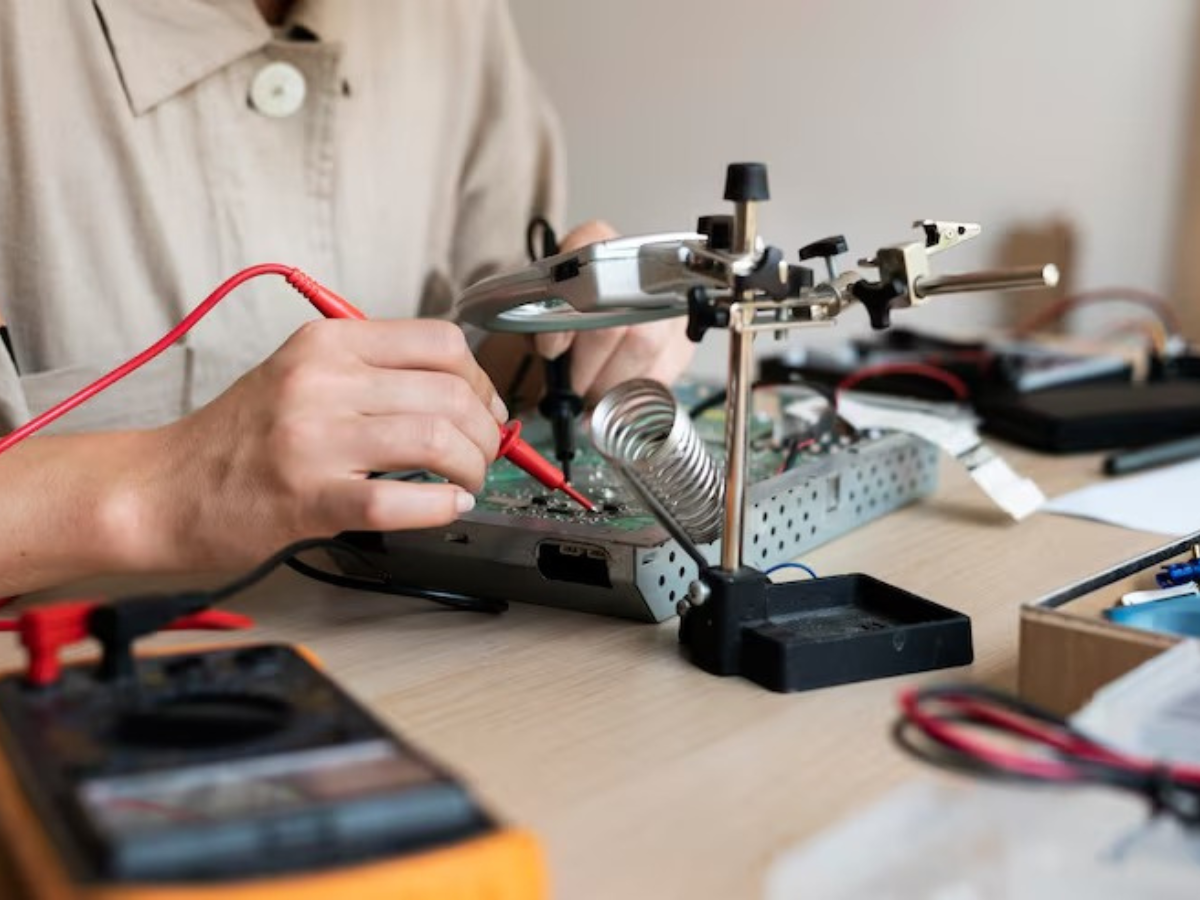Electronic Design and Manufacturing Turns Idea into Product
Bringing an electronic product to market requires more than just a design concept; it demands a clear understanding of electronic design and manufacturing. These services guide your product from initial concept through to full-scale production, ensuring quality, efficiency, and compliance at every stage. This guide outlines the process step by step and shows how expert electronic design and manufacturing support can help your product reach the market smoothly and successfully.
What Are Electronic Contract Manufacturing Services?
Electronic contract manufacturing services (ECMS) involve outsourcing the design, prototyping, assembly, testing, and full-scale production of electronic products to a specialist partner. OEMs (original equipment manufacturers) often choose this approach to focus on core business operations while leaving electronics manufacturing to experts.
According to a recent report, the global electronic contract manufacturing and design services market continues to grow steadily and is expected to expand significantly over the coming years.
Why Use a Contract Electronics Manufacturer?
Access specialist equipment and processes without large capital investment.
Reduce time to market as the prototype-to-production cycle is significantly shortened.
Scale production flexibly according to demand and product lifecycle changes.
Leverage quality assurance and compliance expertise embedded in the service.
Key Services Included in Electronic Contract Manufacturing
Design and Engineering
This includes schematic creation, PCB layout, and design-for-manufacture guidance. It ensures your product is practical to build and meets industry standards.Prototyping
Small-batch production allows functional testing and design iteration. Prototyping reduces costly revisions later in the development process.Component Sourcing and Procurement
Manufacturers leverage supplier networks to source reliable components. This helps avoid delays and ensures quality parts are used throughout production.Assembly and Fabrication
This covers PCB assembly, box builds, and cable harness integration. Expert assembly improves reliability and reduces manufacturing errors.Testing and Validation
Products undergo functional, environmental, and compliance testing. This ensures reliability and adherence to regulatory standards before scaling production.Volume Production and Logistics
Full-scale production includes packaging, shipping, and supply chain management. Contract manufacturers manage end-to-end operations efficiently.
The Lifecycle: From Prototype to Production
Stage 1 – Concept & Design
This stage involves defining product requirements, creating schematics, selecting components, and planning for manufacturability. Arrival Electronics Limited provides design support and early prototyping advice to prevent costly design errors.
Stage 2 – Prototype Build & Validation
Once the design is ready, a small batch is built to validate functionality. This stage allows testing under real-world conditions and refining the design if needed.
Stage 3 – Pilot Production & Pre-Launch
Pilot runs allow testing of manufacturing processes, quality control, and supply logistics at near-volume levels. This step ensures the final production will meet specifications and demand requirements.
Stage 4 – Volume Production & Supply Chain
At this stage, full-scale manufacturing begins, including logistics and post-production support. A reliable contract manufacturing partner ensures consistent quality and timely delivery.
Key Criteria for Choosing a Contract Electronics Manufacturer
Manufacturing Capability & Equipment: A strong manufacturing capability ensures the partner can handle complex products such as multilayer PCBs and fine-pitch components. Having the right equipment reduces errors and improves production efficiency.
Quality Systems & Certifications: ISO 9001, ISO 13485, and IPC standards demonstrate strict process control and consistent quality. Working with a certified manufacturer ensures reliability and compliance throughout the production process.
Supply-Chain Resilience & Sourcing: An efficient supply chain allows the manufacturer to source components quickly and manage risks effectively. This minimizes delays and keeps production on schedule, even during material shortages.
Local Presence & Communication: A UK-based partner offers shorter lead times and more effective communication. Being local allows for easier coordination, in-person meetings, and faster response to urgent needs.
Validation & Regulatory Support: Support for CE/UKCA, EMC testing, and IPC compliance helps prevent delays during product launch. Ensuring regulatory requirements are met maintains product quality and market readiness.
Cost Considerations & Common Questions
What Influences Cost?
Design complexity, including multilayer PCBs and advanced components.
Production volume and economies of scale.
Testing and validation requirements for regulatory compliance.
Component sourcing, packaging, and after-sales support.
How Much Does It Cost?
Global ECMS market estimates show strong growth, with USD 528.9 billion in 2024 and a CAGR of 10.1% projected through 2029. For smaller UK projects, pilot runs may cost tens of thousands of pounds, with full-scale production scaled based on quantities and complexity.
Frequently Asked Questions (FAQ)
Q1: What is the difference between electronic contract manufacturing and in-house manufacturing?
Contract manufacturing outsources design and production to specialists, while in-house manufacturing is managed entirely by the OEM. Outsourcing often reduces cost, risk, and time-to-market.
Q2: How do I choose the right contract electronics manufacturer?
Evaluate capabilities, certifications, supply-chain processes, local support, past experience, and design-for-manufacture guidance.
Q3: What is the typical timeline from prototype to production?
Prototypes usually take 4–8 weeks, pilot production 6–12 weeks, and full-scale production depends on product complexity and quantity.
Q4: Are contract electronics manufacturers suitable for startups?
Yes, startups gain access to manufacturing expertise, avoid capital investment, and scale production as needed.
Q5: What regulatory or compliance issues should I consider?
Consider CE/UKCA marking, EMC testing, RoHS/REACH compliance, IPC standards, ISO certifications, and regulatory documentation.
Conclusion
Choosing the right partner for electronic design and manufacturing is a strategic decision. From concept through to production, you need expertise, reliability, and a partner you can trust. Arrival Electronics Limited provides UK-based manufacturing, design support, and end-to-end services tailored to your project. Contact us today to discuss your next product and receive a tailored quote.
Get Expert Advice and Helpful Downloads
Request Design Consultation: Get expert advice on your electronic design and manufacturing needs.
Request Manufacturing Quote: Receive a tailored estimate for your project from prototype to production.

